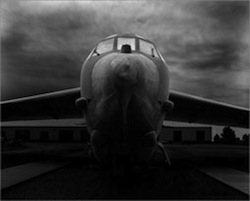NPR Debate Shifts to Declaratory Policy
January 19, 2010
Featured Image
We are happy to serve you a daily summary of the day's top nuclear policy stories each morning, with excerpts from the stories in bullet form.
Stories we're following today:
Debating Declaratory Policy On Nuclear Weapons - Mark Ambinder in the Atlantic Politics Channel [link]
- When it comes to fleshing out President Obama's vision of a nuclear-free world, the rubber meets the road in a single document -- the Nuclear Posture Review (NPR). For months, teams from the White House, the Department of Defense, the Energy Department and the State Department have been debating the United States nuclear strategy, from the size of the stockpile, to the technology and infrastructure needed to preserve current weapons to the quality and depth of the deterrent that our nuclear arsenal is supposed to provide.
- A few debates have been settled, and the degree of consensus on several contentious issues would surprise outsiders. President Obama has envisioned an NPR that alters the conditions under which the U.S. government will publicly declare that it would use nuclear weapons. (This is known as the "declaratory policy.")
- This question, in fact, will be debated at a deputy-level meeting in Washington next week.
King's Struggle to Prevent "The Hell of Thermonuclear War" - Joe Cirincione in the Huffington Post [link]
- For Martin Luther King, Jr., the struggle against racism was part of a larger struggle against poverty, war and injustice. Central to his vision was stopping the nuclear arms race.
- His powerful vision is captured in words carved in the wall of a moving memorial to King in downtown San Francisco: "I refuse to accept the cynical notion that nation after nation must spiral down a militaristic stairway into the hell of thermonuclear destruction. I believe that unarmed truth and unconditional love will have the final word in reality. This is why right temporarily defeated is stronger than evil triumphant."
Medvedev Says U.S. Arms Talks Making Progress - Associated Press [link]
- Talks between the U.S. and Russia on a new arms control treaty have been difficult but the two sides have made great progress toward a deal on limiting their nuclear arsenals, President Dmitry Medvedev said Saturday.
- "The negotiations will continue," Medvedev said. "They are not going easily, but in general we have reached agreement with the Americans on many points."
- Another round of negotiations is scheduled for Jan. 25 in Geneva.
Six Major Powers Move Closer to Considering More Iran Sanctions - New York Times [link]
- Six major powers agreed Saturday that the Iranian response to proposals to altering its nuclear development program had been inadequate and that it warranted consideration of further measures by the United Nations Security Council.
- China, however, which sent a low-level diplomat to the meeting, maintained its position that it opposed new sanctions now. The five permanent members of the Security Council — the United States, China, Russia, Britain and France — along with Germany have been pursuing a “dual track” policy under which they would seek a negotiated settlement, but if that effort stalled, further sanctions would be imposed.
A View from the Dark Side
The National Review: Doomsday's Broken Clock - Keith Payne in NPR [link]
- The journal boasts that the adjustment of the "Doomsday Clock" is done in consultation with many Nobel laureates. The problem with such dramatic timekeeping, however, is that the journal's "keepers of the clock" — no matter how prize-worthy — cannot credibly offer fine-grained predictions about the imminence of nuclear war.
- The uncertainty at work here may be reduced via dogged efforts to understand opponents and contexts, but the Bulletin's atomic timekeeping is showmanship without substance. The keepers of the clock do not and cannot know whether it should be set at five minutes or five hours to midnight, or how it subsequently should be adjusted.
- The point here is not simply about the "Doomsday Clock" per se. It is about a charade that politicizes and exploits one of the most serious of fears: nuclear war. The keepers of the clock are free to throw a bouquet to the Obama administration after throwing a stone at the Bush administration. They ought not, however, continue with the pretense of credible insight into the likelihood and timing of nuclear war; that much is pure political flimflam.



